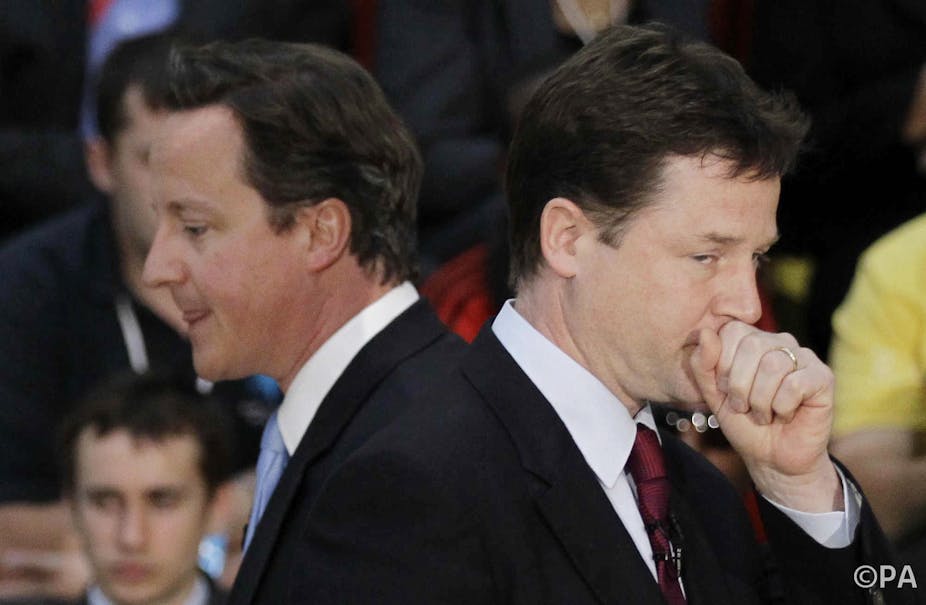Predicting the outcome of the next general election is, at best, a risky undertaking because the game is still very much in flux. Nick Clegg’s problem is that he doesn’t have the luxury of waiting before preparing.
There are three outcomes that should be playing on his mind: a second coalition with the Conservatives, a new coalition with Labour, and a return to opposition. If the electoral arithmetic favours a new coalition with the Tories, that would be the most beneficial outcome; rhetorically and politically, the strategy remains the same. It would be seen as a continuation of the economic and social reforms which both parties have been undertaking since entering power.
If the result favours Labour, Clegg would need to adapt his arguments and objectives accordingly introducing, for example, a greater emphasis on social justice, fairness, and collective responsibility. Should the Liberals return to opposition, however, he will have wasted the opportunity of a generation (or three). His record would be a failure: he has not secured genuine constitutional change in British politics, and he has not delivered on any significant core objective articulated by the Liberal Democrats since their formation in 1988. Remaining in government would allow him another shot at achieving these.
Clegg must also consider what to do if the post-election arithmetic favours a coalition with either party. Superficially, this would put the ball in the other parties’ court, challenging each to present the Lib Dems with the most lucrative offer.
Thus Clegg’s game between now and then is about positioning his pieces strategically to ensure he is able to imply the merits of a coalition with both. This will be problematic, in that it will confirm the suspicion that the party will say one thing to one audience and something else to another. This, however, is the game of thrones which he must play in order to remain relevant. As such, he will start to distance himself slightly from the Tories (but not enough to prevent him backtracking if needed) while getting a little closer to Labour (but similarly not enough to retreat if needed).
Deal or no deal?
Once the result is known, and if a coalition is necessary, Clegg will naturally try to maximise the return in any deal. In 2010, the negotiating team allowed the Conservatives to dominate key ministries while taking a significant number of positions on the peripheries. Clegg also won the promise of a referendum on electoral reform, an attempt at Lords reform and the more nebulous hope of creating a new politics.
All these things failed to shake out as the Lib Dems wanted, whether in parliament or at the ballot box. However, that should not stop these issues from playing a part in any future deal. Clegg has surely learnt the rules of the game enough to know which buttons to press to get what he wants in negotiations like these. Alongside this he will be looking to have a greater say in the broader economic strategy – and of course, there is the matter of Europe.
Cameron’s promise of a referendum in a majority Tory administration will be dead in the water if Clegg is in play. This will then be chalked up by the Conservative Right as yet another promise broken, which will ignite further period of in-fighting within the party that may risk the cohesion of the party. This would make life very difficult for a Tory/Lib Dem coalition, thus making is something Clegg would like to avoid.
It is too early to speculate what deal would be in the table, however it is possible (but by no means certain) that, in exchange for another shot at constitutional reform the EU referendum could take place under a coalition. If the Tories are returned to opposition, however, this ceases to be an issue for the moment as their process of selecting a new leader would occupy them while the new government sets a new narrative.
So Clegg’s current position is understandable if unenviable. He has to balance his rhetoric carefully in a manner that is both distancing yet not destructive to his working relationship with the Tories, while embracing Labour, but not abandoning his present coalition. The extent to which this is successful will be a measure of his strategic abilities.
A further issue for consideration is the extent to which Labour would be willing to work with the Liberals after this parliament. Granted, they both come from different ideological perspectives – but this should not get in the way of a greater perspective that overrides ideals: the acquisition of power. On the day, if the Liberals are the only way for Ed Miliband to enter Number 10 as prime minister, Labour will surely present a genuine offer, rendering everything else political bluster.

